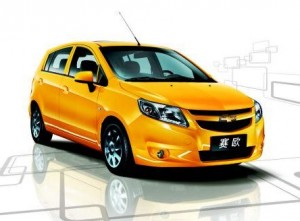Chevrolet finished first among 42 vehicle brands in the 2010 China Customer Service Index study by J.D. Power Asia Pacific. Chevrolet, a brand of Shanghai GM, scored 875 on a 1,000-point scale.
Now in its 10th year, the Power study measures satisfaction among vehicle owners who visit an authorized dealer service department for maintenance or repair work between 12 and 24 months of vehicle ownership, which typically represents a substantial portion of the vehicle warranty period. Five measures are used to determine overall satisfaction with dealer service: service quality, vehicle pickup, service initiation, service advisor and service facility. Overall satisfaction is reported as an index score based on a 1,000-point scale.
The Chevy finish is potentially significant since China is the now clearly the world’s largest auto market. GM has a growing presence there, and it is locked in a battle with VW Group for sales leadership. Record annual sales of 17 million are expected this year in China, a 25% increase from 2009.
Vehicle sales by General Motors and its joint ventures in China rose 22.2% on an annual basis in July to 176,645 units, a new record for the month. Sales growth by GM’s Shanghai GM joint venture remained especially strong, rising 42.1% on an annual basis to 80,269 units – also a record for the month of July.
Demand for its Chevrolet lineup jumped 70.1% on an annual basis to 35,385 units, driven by the ongoing popularity of the Cruze and New Sail passenger cars, as well as sharply increasing demand for the Captiva SUV. On July 28, sales of its Chevrolet products passed the 1 million mark since Shanghai GM began offering the brand in 2005.
After Chevrolet, following in satisfaction rankings are Guangqi Honda (874); Dongfeng Honda (871); Roewe (869); and Dongfeng Peugeot (864). Roewe is the only China domestic brand to rank among the top five. Dongfeng Peugeot is the most improved brand in 2010, moving to fifth rank position from 16th place in 2009.
The top five brands in 2010 demonstrate improvement in all five factors, compared with 2009, with the most notable increase occurring in satisfaction with service initiation. This is largely driven by an increase in the proportion of customers who indicate making appointments to schedule vehicle service, which averages 32% in 2010, compared with 21% in 2009, according to Power.
While premium brands, collectively, still outperform mass-market brands as a whole (849 vs. 817, respectively), the highest-performing premium brands—Audi and Lexus—tie for sixth place with a score of 861 each. Audi improved notably, from its 10th rank position in 2009. Premium brands have improved in 2010 by eight index points from 2009, compared with a one-index-point improvement by mass market brands.
The study also found that approximately one in five (22%) customers of non-premium vehicle brands indicate they waited to speak to a service advisor in 2010, a decrease from 28% in 2009. In comparison, more than one in four owners of premium-brand vehicles report waiting before being greeted by the service advisor. The higher portion of premium brand owners in the waiting line may be attributed to the recent rapid increase in sales for luxury brands in China, which may strain the dealer’s ability to attend to service customers quickly.
“Historically, service customers have perceived premium vehicle brands to be the market leaders in delivering high-quality customer experiences,” said Dr. Mei Songlin, general manager of research at J.D. Power Asia Pacific, Shanghai.
“However, when mass-market brand dealers place the proper focus on customer service and take steps toward dealer network building and implementation of customer service systems, they can also achieve these high levels of customer satisfaction,” Songlin said.

